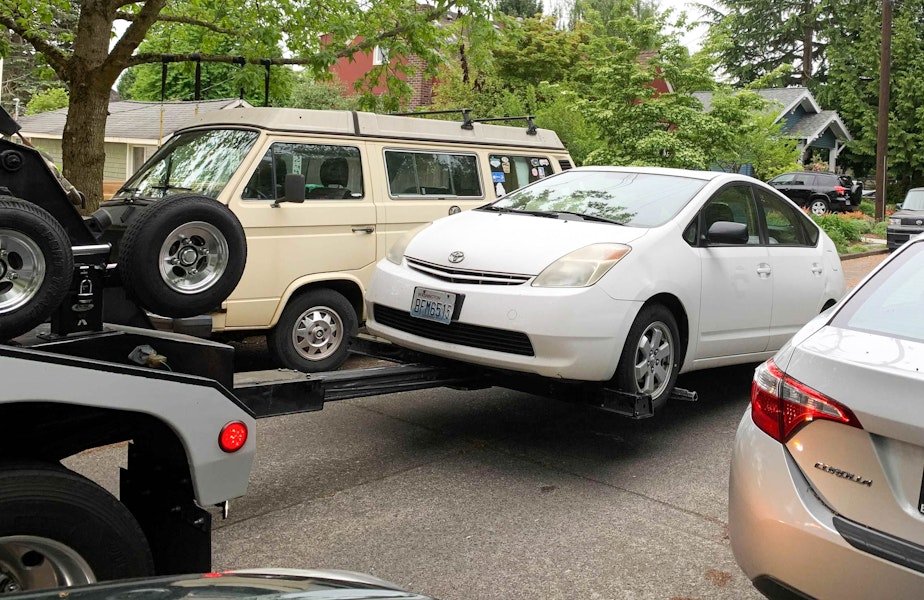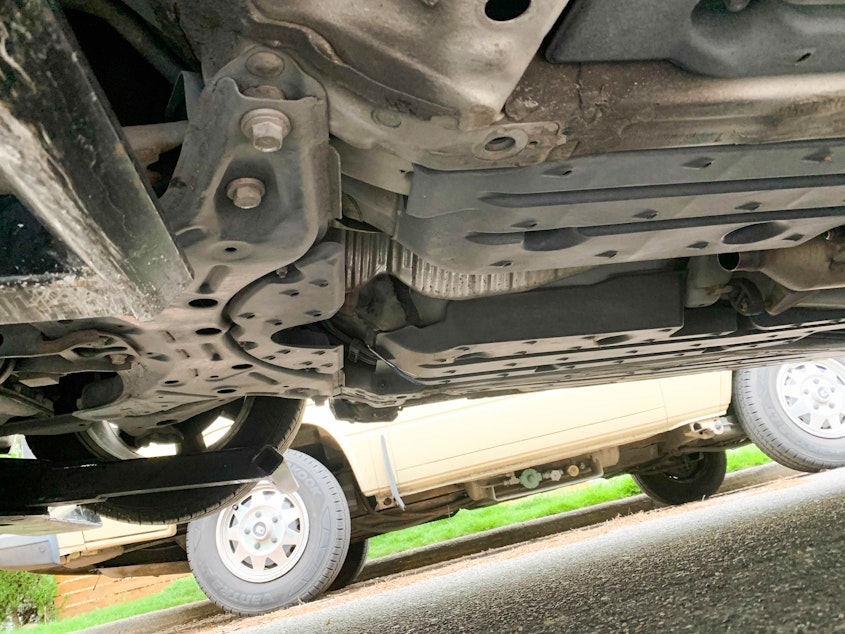Who is stealing all the catalytic converters in Seattle?

If you own a Toyota Prius or a Honda Element, beware. Catalytic converter theft has shot up more than 3,800% in Seattle and King County over the past year.
Prime targets include the Toyota Prius or a Honda Element.
In 2019, there were 24 reported thefts of catalytic converters in the Seattle area. In 2020, that number jumped up to roughly 950 thefts. That doesn’t include the thefts that were not reported to law enforcement.
News stories about catalytic converter theft in the past year focus on one or two people, painting a repetitive image of a disheveled person found with 500 catalytic converters in the back of their truck.
The King County Sheriff's Office believes that most street-level suspects are looking for a quick way to make money, including those struggling with drug addiction.
But these singular instances do not paint a big enough picture, according to the sheriff's office. Detectives have turned their attention to entities buying these catalytic converters: refineries, processors, all mid-level brokers.
It is a national trend that has hit Seattle particularly hard — the most popular cars to take catalytic converters from appear to be Prii (plural for Prius). They’re the gold standard according to the Sheriff's Office.
Sponsored
A catalytic converter is valuable for the precious metals inside. Platinum, palladium, and rhodium coat the ceramic base of the catalytic converter.
Resale prices of palladium hover around $3,000 an ounce. Rhodium can go for $24,000 an ounce. Palladium is used in electronics, dental equipment, jewelry, aircraft spark plugs, glasses, and flutes.
Shiny, beautiful, and durable, this trio of metals help the catalytic converter — located underneath the car — speed up chemical reactions to cut back on exhaust emissions, reduce toxic gas, and pollutants from entering the air.
Other earth-abundant materials don’t compare to these unique catalyst metals, says Brian Flinn, an emeritus professor at University of Washington’s Department of Material Science and Engineering.
“They’re the ones that work the best,” Flinn says. “Their reactions occur faster. They’re some of the best catalysts that we know.”
Sponsored
Like all good things, you notice when they’re gone.
Flinn's catalytic converter was stolen in 2011. When he started his truck, it made an awful clattering, clanking noise. “Did I hit something last night?” he wondered.
“I went and looked under my truck, and there was four feet of my exhaust pipe missing. I’m like, 'what the heck?'”
Losing a stolen catalytic converter can cost car owners between $500 to $2,000 to replace. Insurance may cover the loss, but then there is a deductible to pay.

Taking precautions
Tracy Record, editor of the West Seattle Blog, says stolen catalytic converters were first reported to the blog as a weird and unusual trend in 2008. In the past few months, she’s heard of dozens being stolen, her Honda Element among them.
Her car let out a deafening sound when she turned the key in the ignition. “I’ve never been through a tornado,” Record says. “But in movies where the tornado comes, and it’s just this incredibly deafening roar — something close to that.”
West Seattle Blog asks readers to write in their experiences. Record says most people seem to believe they have adequately protected their car.
“They parked under a bright light, or they parked in their driveway,” she says. “What they don’t realize is that it can happen in literally a minute.”
A sign of catalytic converter theft underway: If you hear sawing at 4 a.m., it’s probably not a lumberjack. And while it makes intuitive sense to park one's car in a visible place, under a street light for example, that may make them easier to identify.
Sponsored
One key tip is to park your car in a less visible place, preferably in a garage. This is not an easy option for everyone in Seattle, particularly those living in apartments, who rely on street parking, or those who live in their cars. Catalytic converters have no identifiable traits connecting it to a car: No descriptions of the make or model, and no VIN numbers. It’s just a hunk of lucrative metal under the car.
In the The Crime Watch section of the West Seattle blog, neighbors share makeshift solutions. One person says they use a hot wire to deter thieves. Other solutions include painting the catalytic converter so that it’s more unique, and therefore easier to identify if found.
Where do catalytic converters go?
Fingers point to local scrap metal yards.
But Jon Howe, owner of West Seattle Recycling, says he doesn’t see too many catalytic converters. He says that’s likely because the scrap metal yard doesn’t pay very much. Of the few catalytic converters that pass through, sales leaders at West Seattle Recycling pay $40 to $50.
Sponsored
Plus, Howe says he’s not that interested in catalytic converters. There is no guarantee how much precious metal could be inside, and it’s not good for his brand.
“I have to work very hard to give our business a good image. I don’t need to buy anything stolen,” he says. “I’ve been in the business too long. And I have my reputation and my legacy staked on having a good honest solid business that does business legitimately.”
By email, Ryan Glant, president of Pacific Iron and Metal, says his company also doesn’t get many catalytic converters.
“We have very little catalytic converter purchasing as part of our operation,” Glant says. “Because we’re not an auto wrecker or parts yard, we don’t really see that item here compared to others in the industry.”
Large sales of catalytic converters happen on online sites like Offer Up and Craigslist, says Sgt. Tim Meyer of the King County Sheriff’s Office. He says the plainclothes detectives have become aware of how sales take place.
On Craigslist, for example, “There are people that are offering 'no hassle purchases,'" Meyer says. "They'll meet you in a parking lot and just pay you cash."
Meyer says they can't prove the catalytic converters are stolen due to the lack of identifiable features. And simply being in possession of a catalytic converter is not a crime — it might actually belong to the individual. This poses a problem for solving the open cases his office is working on.
Meyer says his office is “trying to take out the demand side, so it becomes a much less attractive commodity."
As long as demand for palladium, platinum, and rhodium stays high, there will be an economic incentive for mid-level brokers to attract “street level suspects to go out there and steal converters,” Meyer says.
The King County Sheriff’s Office hopes the state Legislature will enact a law to make stealing catalytic converters a felony, as the state of Indiana has.
At a local level, City Councilmember Lisa Herbold worked with police on the problem earlier this year. She called for creating a governmental regulatory response to the dramatic national increase in these thefts.
In the meantime, detectives are honing in on mid-level brokers buying hundreds of catalytic converters.
You can hear this story on KUOW's daily podcast Seattle Now here.




